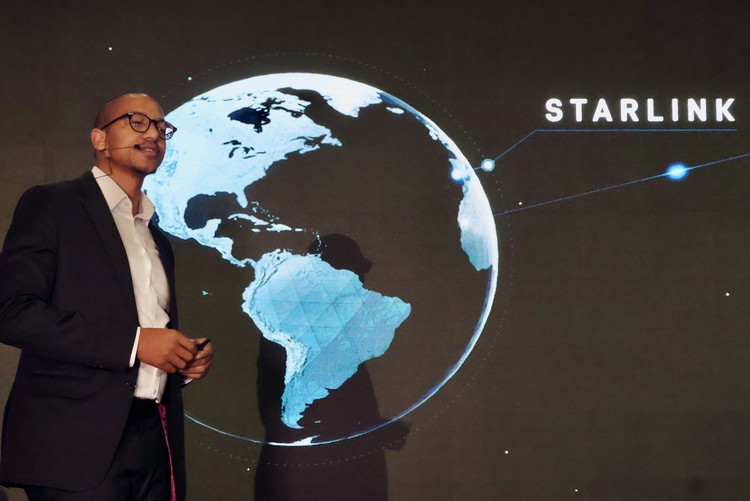Starlink launches amid job losses in Lesotho
Elon Musk’s satellite internet service comes after months of US funding cuts and tariffs put immense pressure on the country’s economy
The CEO of T-Connect Lesotho, Phelane Phomane, at the launch of Starlink. Sechaba Mokhethi
- Starlink, Elon Musk’s satellite internet service, has launched in Lesotho through T-Connect Lesotho.
- The launch comes after massive job losses stemming from 50% US tariffs on Lesotho imports and funding cuts that were led by Musk in the Trump administration.
- Prime Minister Samuel Matekane’s government has granted Starlink a ten-year licence despite local opposition, in what critics see as appeasement of US interests.
- T-Connect says it will create 10,000 direct jobs.
T-Connect Lesotho, a licensed reseller of Starlink, Elon Musk’s satellite internet service, officially launched on Monday, after mounting economic pressure on Lesotho from the US.
The country experienced widespread job losses after major US funding cuts to USAID and PEPFAR, led by Musk’s “cost-cutting” Department of Government Efficiency (DOGE) in President Donald Trump’s administration.
Further compounding Lesotho’s economic woes, Trump imposed a 50% tariff on imports, among the steepest in the world. This led to partial closures of factories and mass lay-offs, particularly in the textile industry and in frontline healthcare and school nutrition programmes.
Despite mounting local opposition, Prime Minister Samuel Matekane’s government has granted Starlink Lesotho – a subsidiary of Musk’s SpaceX – a ten-year operating license to run a satellite internet network in the country. The step is seen by some as appeasement of the US.
Musk recently stepped down from his leadership role in DOGE to focus on his business interests.
On Sunday evening, Starlink took to X, a Musk-owned social media platform, to announce: “Starlink’s high-speed internet is now available in Lesotho.” Musk re-posted the message to his millions of followers.
During Monday evening’s launch, attended virtually by Starlink Vice President of Business Operations Lauren Dreyer, T-Connect Lesotho CEO Phelane Phomane said the venture is expected to create 10,000 direct and 50,000 indirect jobs in Lesotho.
“We will develop AI-powered data centres using Starlink across Lesotho, South Africa and Botswana in collaboration with the Development Bank of Southern Africa (DBSA),” Phomane said.
He said the Lesotho data centre, to be built high in the mountains, “will be the highest and most unique data centre in the world … and one of only four in the world powered by Starlink”.
He promised Starlink-powered community internet hotspots in all ten districts within weeks. These would allow anyone with a special code to access the internet without data caps.
“We are not going to be selling megabytes but time to use the internet without limitations and it’s going to cost less than a loaf of bread, which is M14 (R14),” Phomane said.
T-Connect is also banking on the deep African networks of its chairperson Nolo Letele, who is widely credited with expanding MultiChoice and DStv across 50 African countries.
Letele said, “It’s exciting to launch this on home soil, and we believe we will be able to bring coverage to pretty much anywhere in Lesotho where the sun shines.”
Letele noted there were already Starlink installations in remote schools in the mountainous Thaba-Tseka district, places that “would never have internet” without Starlink.
He said DBSA is the main sponsor of the project in Southern Africa and is now supporting Starlink expansion in ten countries.
Acting Minister of Communications Matjato Moteane said that for Lesotho to progress, it must tackle the barriers posed by poor terrain and inadequate digital infrastructure.
“Due to our small market, all costs tend to be high,” he said. “So, any provider who can keep service costs low will make a positive contribution to the country.”
Moteane said Starlink could also help solve persistent problems of unstable connectivity, even in urban areas.
Support independent journalism
Donate using Payfast

Don't miss out on the latest news
We respect your privacy, and promise we won't spam you.
© 2025 GroundUp. This article is licensed under a Creative Commons Attribution-NoDerivatives 4.0 International License.
You may republish this article, so long as you credit the authors and GroundUp, and do not change the text. Please include a link back to the original article.
We put an invisible pixel in the article so that we can count traffic to republishers. All analytics tools are solely on our servers. We do not give our logs to any third party. Logs are deleted after two weeks. We do not use any IP address identifying information except to count regional traffic. We are solely interested in counting hits, not tracking users. If you republish, please do not delete the invisible pixel.

